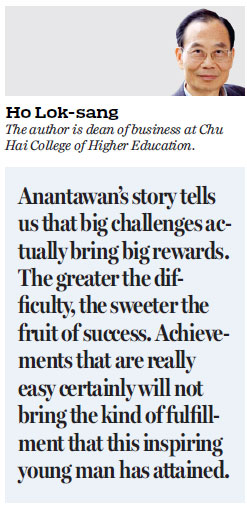Aone-handed violinist has much to teach us
Updated: 2017-11-07 07:41
(HK Edition)
|
|||||||
Ho Lok-sang gives young musician Anantawan as an example of what a determined person with a loving family can achieve
Last Sunday the RTHK program Footprints of the Old Days aired an interview with Adrian Anantawan, the one-handed violinist-cum-educator, and his mother, who talked about how she raised her three children and how her three children each had carved out a life of love and devotion that offers an example for all of us to learn. The host Candy Chea Shuk-mui congratulated Anantawan's mother, saying that she had brought three gifts to the world, which has become a better place for everybody on that account. She did not exaggerate.
I had used Anantawan's story in my book: Psychology and Economics of Happiness, to illustrate what constitutes successful living. While the world has lots of things for us to complain about, Anantawan chose not to waste his time in useless complaints or even add to the world's troubles as discontented people often do. He chose to work hard to make the world a better place to live in.
This young man started learning the violin at 9. But he was born without a right hand. So most people would think that he could not play the violin. But not only did he make it, but he also told other handicapped people that they too could make it, and went about teaching them the techniques and showing them how the mindset could be reshaped to produce miracles.
A good question is: how could he do it, despite everything?

In the beginning, he was born into a loving family, with loving parents who would give him all the opportunities he could take advantage of to develop his potential. His parents would not know how far the child would go, but they would offer what they can to facilitate his learning. He had great, patient teachers. He also had kind-hearted and agile technicians-engineers who would design a custom-made gadget for him, so that he could grip and use the violin bow effectively. Naturally there were always people who would not believe he could do it. But they would not stop the young Anantawan from working hard.
So the first factor behind his success is lots of "love". In return for this love, he has also learnt to love others. This motivated him to be a violin educator, especially for the handicapped.
In the radio interview, Anantawan said he never thought much about his handicap. He just focused on what he could do. This is an important element of wisdom ("insight"). Never mind if the glass is half full or only a quarter full. He just did his very best focusing on what he could do. Although he worked very hard, he took good care of his health, so his efforts could be sustained.
Anantawan would not be intimidated by difficulties, nor would he allow himself to be a victim of bullies or discrimination. He just kept going. He now holds degrees from the Curtis Institute of Music, Yale University and Harvard Graduate School of Education. This is the virtue of resilience or "fortitude".
Anantawan has always lived with a strong sense of purpose. When he trained for his violin, when he studied for his music and his education degrees, his mind was always the same: to discover and realize his potential. Now that he is performing around the world, and spreading his word of love and teaching young people to love music and to play the violin, he is just as passionate about life as he was before. This is the virtue of "engagement".
"Love", "insight", "fortitude" and "engagement" are the four ingredients to a happy, successful life. I have found that happiness is always and everywhere associated with these aspects of "mental capital". This is as true for an individual as it is for an organization, and as true for an organization as it is true for a city. A company must show caring for the well-being of its employees and that of their families, focus on what it can do best and realize its potential given the opportunities open to it, face adversities with calm and resolve, and must collectively work with a strong sense of purpose in order to succeed. Similarly, Hong Kong needs to care for all members of the community, particularly the underprivileged and those hit by misfortune, and must learn from our mistakes and build on our strengths, while keeping an eye on sustainable development. As well Hong Kong needs to develop a strong sense of fearlessness in face of challenges and adversities. Only when Hong Kong people share the same overriding purpose of building a sustainable smart city where we live in peace and prosperity in mutual respect and care for one another, can we realize the potential of Hong Kong as a truly vibrant and successful city which we all want to call home.
Anantawan's story tells us that big challenges actually bring big rewards. The greater the difficulty, the sweeter the fruit of success. Achievements that are really easy certainly will not bring the kind of fulfillment that this inspiring young man has attained.
(HK Edition 11/07/2017 page7)